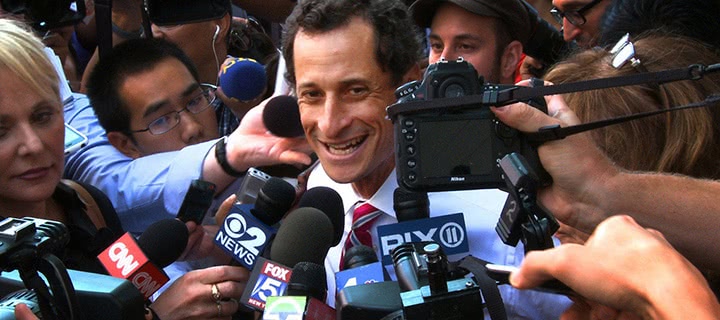Would a rose by any other name smell as sweet?
That’s the question one can imagine Anthony Weiner was asking himself amid his 2011 scandal – one in which the then-member of the US House Of Representatives was caught out sending indecent selfies to a number of women. After all, when a man with the last name Weiner starts mailing out photos of his weiner, the headlines write themselves.
Yet despite the ‘tee-hee’ nature of its subject matter, there is nothing cruel or crude about Weiner, a documentary about the politician and the media maelstrom he found himself caught up in after his embarrassing sexts were revealed to the world. Elyse Steinberg and Josh Kriegman, the film’s co-directors, take a surprisingly intimate look at their subject, painting Anthony Weiner not as a punchline or as a hero, but as a conflicted figure who is ridiculous, relatable and infuriating in equal measure.
“My co-director Josh knew Anthony prior to making this film and I didn’t,” Steinberg explains. “So I think I was much like a lot of audience members and New Yorkers in general. I sorta had a punchline, caricature view of Anthony. [But] when I met him and looked through the footage I realised he is … [a] more complicated, human person than I had previously thought.”
The film kicks off with Weinergate ’11, but swiftly jumps forward two years, following Weiner as he attempts to run for Mayor of New York City while weathering the predictable media storm and snarky headlines. Though he initially takes the onslaught well, the ever-escalating nosiness of mainstream reporters and his own frayed temper mean that before long he finds himself clashing with his own staffers, TV hosts, and even random members of the public.
“The ground rule going in was that if at any point they wanted us to turn off the cameras, we did,” Steinberg explains of her amazingly candid film. “And there were a few moments when [he did], but otherwise, he said he would allow us to film and he did. It does lead to the question you’re maybe going to ask next, which is why did he allow us to film?
“That’s a question we get often and that’s a question we wondered about ourselves. [In the film] Anthony says he [wants] to be viewed as a whole person … I think that’s why. That was what we hoped to show audience members – a more complicated look at a person who had just been reduced to a punchline.”
Though Weiner is the film’s central subject, he’s not necessarily its hero. Weiner’s most sympathetic character is the politician’s wife, Huma Abedin, a close friend of Hillary Clinton and a stoic, startlingly intelligent woman whose decision to stick by Weiner makes her as much of a target as her partner. Before long, Abedin is being treated as both a bullseye and a pawn, as Weiner and those busily trying to take him down begin spending a huge amount of energy painting the young mother in a whole variety of lights.
“[Huma] is obviously more quiet and reserved than Anthony,” Steinberg says. “The relationship we had when we were filming was with him. But I think Huma wanted – I can’t speak for her – but I think she wanted a different version of the story than the one that was playing out in the tabloids. She was hoping for a more complete version than the judgement and the caricature that was being placed on her and is placed on women in these stories.”
To imply that the tabloids simply began ‘judging’ Weiner and his wife might even be an understatement. In one of the film’s more shocking moments, a crowd of reporters refuse to part for Anthony and his young pram-bound son until he answers their questions.
“There was a certain amount of sensationalism that overtook the conversation and Anthony couldn’t talk about anything other than the scandal,” Steinberg says. “I think the film does provide a look about how political coverage these days can be driven by spectacle and a lack of substance. That is part of what we wanted to show – the way these stories can overtake everything else. The media played a role, Anthony played a role, and we as consumers play a role.”
Of course, given the current American presidential campaign, an exploration of the way the media, spectacle and power all intersect is exceedingly on point. “I think we’re excited for this film to be very relevant to our current presidential race,” Steinberg agrees. “Especially in terms of spectacle and especially in terms of Donald Trump. I think while Anthony and Trump are very different politically and personally – and Anthony had ideas that he was really excited about; really progressive ideas – I think that they both understand about putting on a show. In order to have a voice in today’s 24-hour news cycle, you’ve gotta entertain.”
There’s really only one question left: has Weiner himself seen the film? “He hasn’t,” Steinberg says, a note of disappointment audible in her voice. “We offered to show it to him many, many months ago, before it was finished – before we premiered at Sundance. And he said no. He has said that he is not eager to relive it. And we can respect that. But we look forward to him seeing it at some point.”
Weiner (dir. Elyse Steinberg and Josh Kriegman) shows, as part of the Sydney Film Festival 2016, at State Theatre Saturday June 11, Dendy Opera Quays Tuesday June 14 andEvent Cinemas George Street Sunday June 19.

































